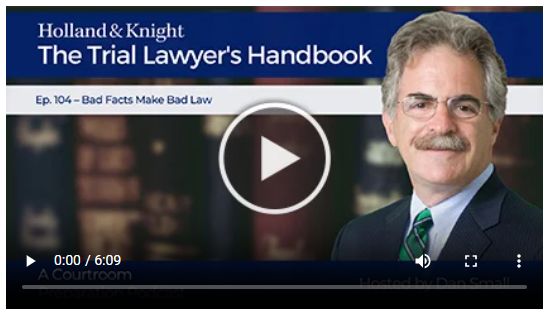- in United States
- within Criminal Law topic(s)
In this episode of "The Trial Lawyer's Handbook" podcast series, litigation attorney Dan Small explains the exclusionary rule, which states that evidence obtained by illegal methods must be excluded at trial. In the Cammarata drugs-and-murder Racketeering Influenced and Corrupt Organizations Act (RICO) case, a voluntary eight-page confession was initially suppressed under the exclusionary rule because the Texas Rangers did not include the arrested individual's last name on the warrant. Mr. Small appealed the decision, and the U.S. Court of Appeals for the Fifth Circuit ruled in his favor, making the confession admissible at trial. The ruling helped establish the "good-faith exception" to the exclusionary rule, which was soon officially adopted by the U.S. Supreme Court.
Podcast Transcript
Dan Small: When law enforcement breaks the law, they should not reap the benefits of their unlawful conduct. That's the theory behind the exclusionary rule: When law enforcement obtains evidence by some illegal means, that evidence should be excluded from use at trial. The hope is to both avoid an injustice against the defendant and deter law enforcement from future illegality. But of course, excluding evidence may mean depriving the jury of important facts, and that may allow a criminal to go free. So how far do we go down that road?
Unlike in legitimate business, when criminals meet, they don't often introduce themselves formally. "Well, hello, here's my business card." No, it doesn't happen that way. As a result, in the Cammarata drugs and murder RICO case we've discussed in recent episodes, one well-established member of the organization we knew only as Dennis. So in the indictment, we charged Dennis LNU, last name unknown, and gave a description. An arrest warrant was issued on that basis. As the Texas Rangers fanned out and arrested and questioned other members of the organization, they learned more about Dennis, including his name and address.
Believing they had to move quickly before Dennis learned of the indictment and took off, they went to the address. Dennis' roommate opened the door and stepped back. The Rangers walked in, and there was Dennis, sitting on the couch. They arrested him and took him in. Dennis apparently decided that the party was over and almost immediately started confessing. Within hours, he had dictated and signed a detailed and chilling eight-page confession to, among other things, execution-style, cold-blooded murders. We expected him to plead guilty and cooperate against Cammarata.
But then Dennis got another lawyer, who saw that the arrest warrant had no last name and discovered a disputed line of cases that basically said the Rangers should have gone back to the court and obtained a new, more complete warrant with the new information they had obtained. The defense filed a motion to suppress the confession. We opposed vigorously, and we were shocked when the judge agreed with the defense. He found that the Rangers had acted in good faith and reasonably believed that the arrest warrant was proper, but technically it was not. Since the confession followed from the technically deficient arrest, under the exclusionary rule, as it then stood, the entire confession had to be excluded. Eight pages of cold-blooded murder and mayhem.
We were angry and decided to appeal. Several cases at the time had begun to explore the idea of a "good faith exception" to the exclusionary rule. If law enforcement acted reasonably and in good faith, did it really make sense to exclude otherwise admissible evidence? Our case, we thought, was as strong as you could get to support that idea. A voluntary, detailed, written confession to cold-blooded murder, excluded based on a disputed technical issue that the arresting officers knew nothing about.
We appealed the district court judge's decision to the Fifth Circuit U.S. Court of Appeals. We argued that we understood the purpose of the exclusionary rule to deter unlawful conduct, but that purpose didn't apply here, and the damage to justice was too great to apply the rule arbitrarily. Amazingly, the Court of Appeals agreed. In a powerfully worded opinion, the court reversed the judge's suppression order. After a careful analysis of the law and the arresting officer's actions, the Court held:
"We question on these facts the claimed teaching value of the exclusionary rule. Suppression would teach, but the lesson would be one of cynicism and disrespect for a rule of law so wooden as to require application even when its purpose is not served. In short, the marginal increment in deterrence that could be achieved by applying the exclusionary rule does not justify the societal costs of denying the jury access to Mahoney's confession."
If you want to read the full opinion, the case is U.S. v. Mahoney, 712 F.2d 956.
The defense filed for the case to be heard in the Supreme Court, and we prayed that court would take the case. The good faith exception was still relatively new and unsettled law. We thought that our case was a good one to settle it. Alas, the Supreme Court declined to hear the case. It was a win for us because it left the appellate court's decision in place, but it was still disappointing that our case wasn't picked. Ultimately, the Supreme Court took another case and adopted the good faith exception as the law of the land. Bad facts, in this area at least, may no longer make bad law in a good case.
The content of this article is intended to provide a general guide to the subject matter. Specialist advice should be sought about your specific circumstances.


